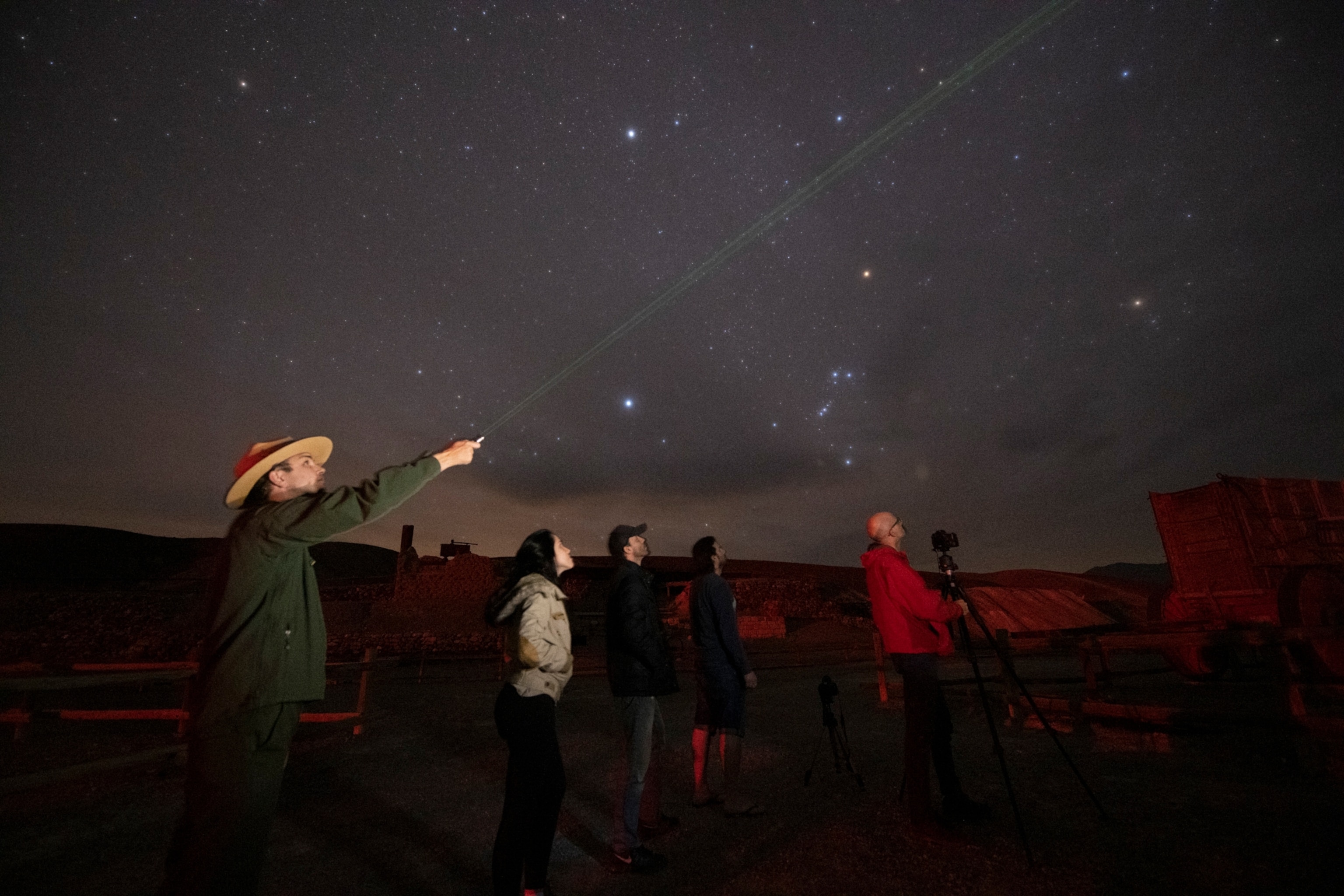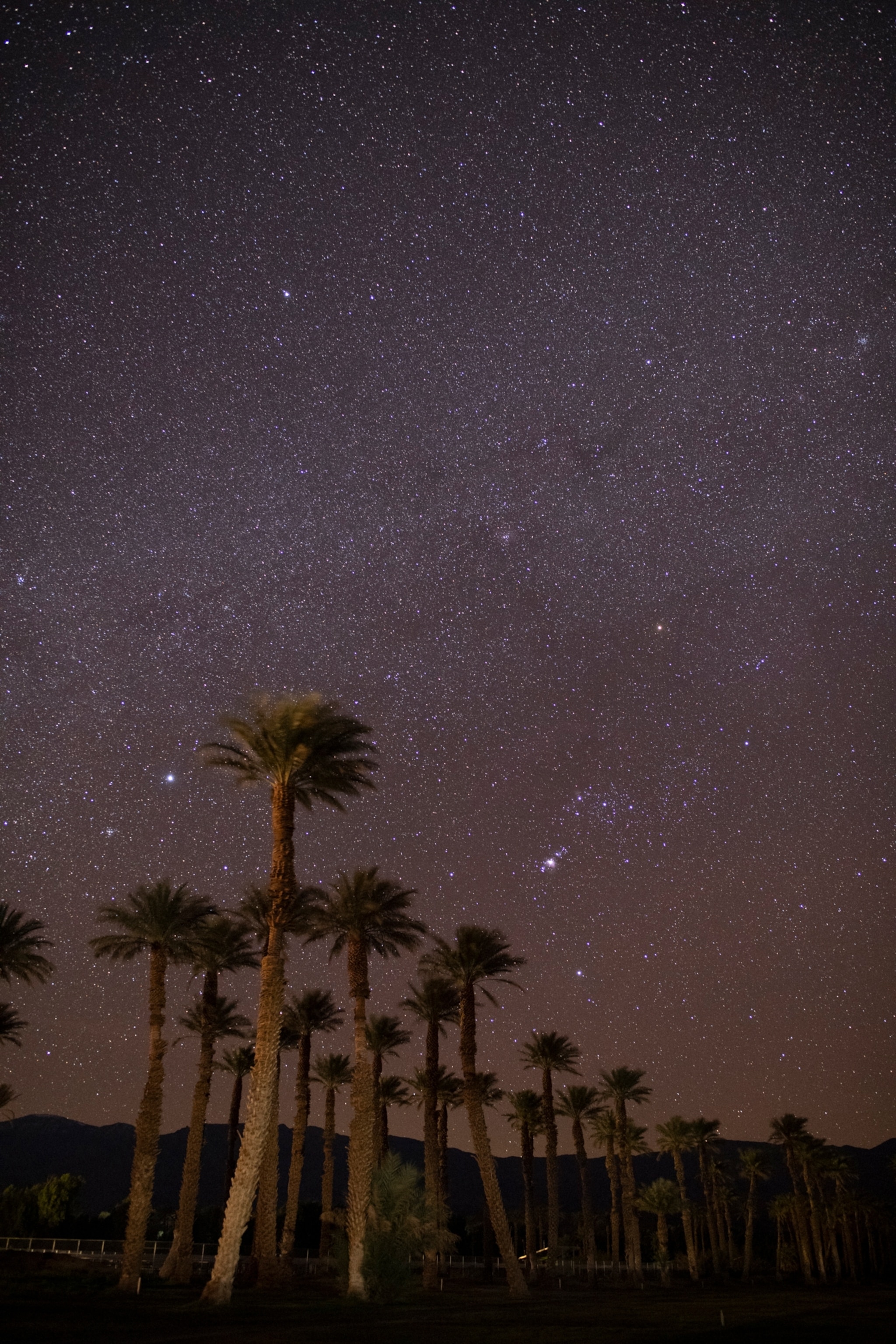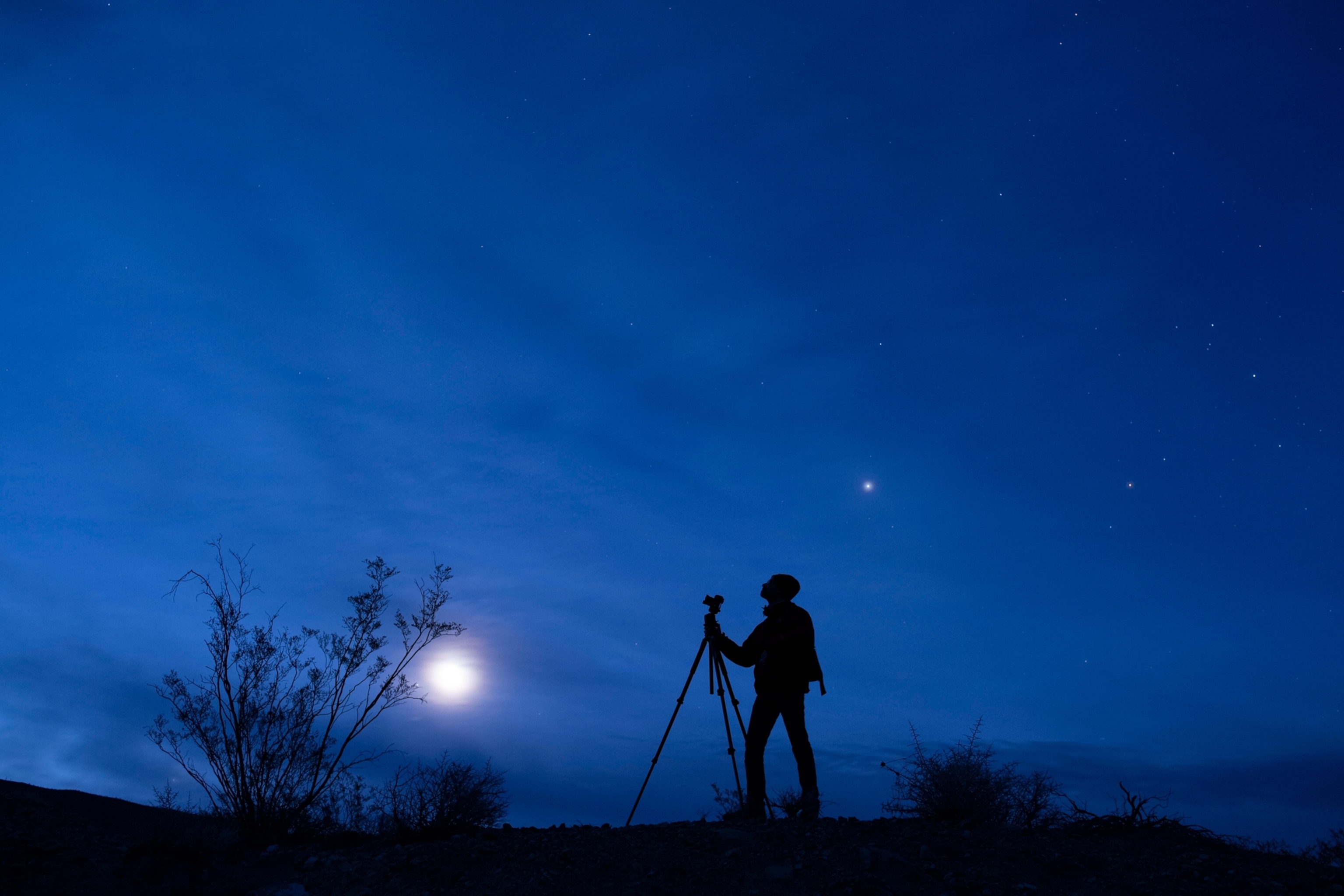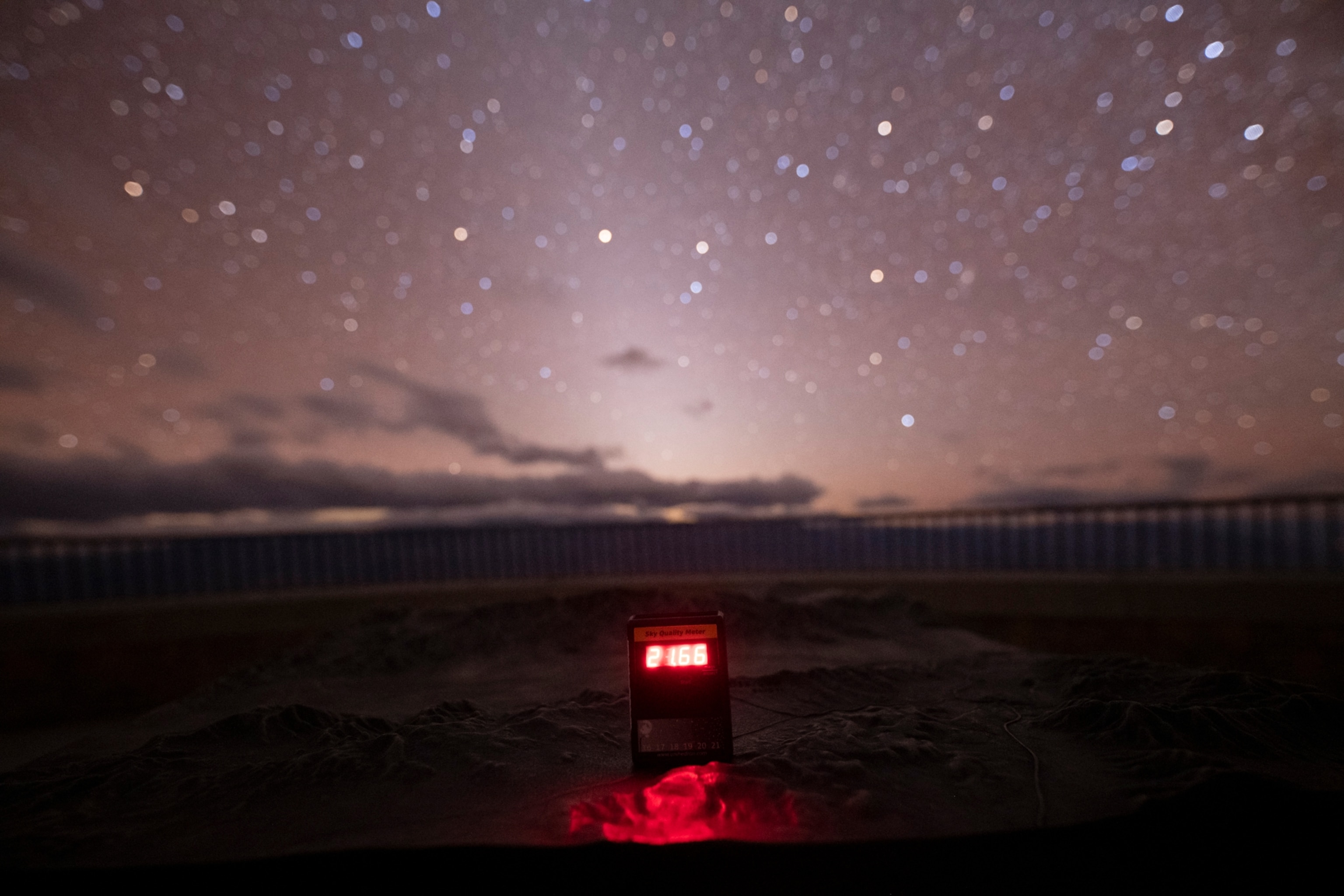Our nights are getting brighter, and Earth is paying the price
Electric lights have revolutionized our lives, but as illumination increases, the toll on wildlife and human health is becoming harder to ignore.
On a clear night in 1994, an earthquake rumbled beneath Los Angeles and caused a city-wide power outage just before dawn. Startled awake, some residents who had stumbled outside called various emergency centers and a local observatory to report a mysterious cloud overhead.
That weird object turned out to be the band of the Milky Way, our home galaxy, which had long been obscured from view by the city’s lights.
Arguably, the light bulb is the most transformative invention humans have introduced to this planet. By flicking a switch or pushing a button, we can push back the veil that would naturally shroud our lives each night. Now, we work long after the sun sinks below the horizon. We play games outside until the hours stretch into double digits. We more safely roam city streets after dark.



But if light bulbs have a dark side, it’s that they have stolen the night. The excess light we dump into our environments is endangering ecosystems by harming animals whose life cycles depend on dark. We’re endangering ourselves by altering the biochemical rhythms that normally ebb and flow with natural light levels. And in a primal sense, we’ve lost our connection to nighttime skies, the tapestries into which our ancestors wove their star-studded stories, timed the planting and harvesting of crops, and deduced the physical laws governing the cosmos.
“The disappearance of the night sky is tied up in our ever more fast-paced world,” says Amanda Gormley of the Tucson-based International Dark-Sky Association. “We lose something essential; we lose a part of ourselves when we lose access to the night sky. We lose that sense of stillness and awe that should be right over our heads every night.”
Now, as the consequences of light pollution tiptoe from the shadows and into the spotlight, cities, regulatory agencies, and conservation groups are agitating for solutions. And in some areas, substantial improvements are already in place, powered by a new wave of cheaper, more energy-efficient light bulbs.
Hiding in the light
The International Dark-Sky Association defines light pollution as “the inappropriate or excessive use of artificial light.” That can take many forms, including glare, or excessive brightness; sky glow, which drowns out the night sky over urban areas; light trespass, or stray light falling where it is not needed; and clutter, or confusing groups of bright light sources.

Though it may not be as immediately toxic as a chemical spill, light pollution is now among the most chronic environmental perturbations on Earth. In 2016, scientists estimated that 99 percent of the continental United States and Europe experience some amount of light pollution. Based on observations from the Suomi NPP satellite, a third of humankind cannot see the Milky Way, including nearly 80 percent of North Americans. Another study from 2017 suggests that worldwide, light pollution increased by roughly two percent a year between 2012 and 2016—that might not sound like much, but percentages compound.

“You would think that environmental organizations would be all over light pollution, because it’s just such a complete waste,” says Christopher Kyba of the German Research Center for Biosciences. “It’s a place where you can reduce energy consumption with basically no loss to anyone.”
For indoor lights, the switch to new kinds of bulbs has often been about energy savings, as homeowners moved from conventional incandescent bulbs to cheaper, brighter alternatives such as compact fluorescents. Now, light-emitting diodes, or LEDs, are fueling an indoor and outdoor lighting revolution that could see energy consumption drop dramatically both for individual consumers and entire cities. When Los Angeles recently replaced more than 150,000 streetlights with LEDs, the city saved roughly $8 million dollars annually, or more than 60 percent on energy costs.
But while LEDs are cheaper than previous alternatives, they come with hidden costs. People tend to overuse them and over-illuminate areas, and without proper shielding, these much brighter bulbs cast large amounts of wasted light in all directions. What’s more, the inexpensive white LEDs often found in street lights emit wavelengths of blue light that bounce around in the atmosphere, potentially increasing sky glow. These wavelengths are also known to affect animals—including humans—more dramatically than lights emitting in other parts of the spectrum.
Unfortunately, measuring the actual impact of LEDs from orbit has been tricky, because most Earth-observing satellites are not sensitive to those wavelengths of light. In Kyba’s 2017 study, which relied on orbiting satellites, light pollution in the United States seemed to remain more or less flat. Kyba suspects that our skies are actually getting brighter, and he attributes the apparent flatness to satellites that can’t see blue-white LEDs.
He and others say that dimmer, warmer, and shielded LEDs could be hugely beneficial for both dark skies and energy budgets.
“Done well, LEDs could save the planet, in the sense of reining in light pollution,” says astronomer John Barentine, also of International Dark-Sky Association. “Done carelessly, it could be devastating.”


Fatal impact
One autumn morning back in 1990, just after dawn, Michael Mesure roamed Toronto’s financial district, walking the streets between the city’s tallest, brightest buildings. It was a fairly normal routine for Mesure, who often spent his daybreak hours collecting and cataloging the previous night’s casualties and attempting to rescue and rehabilitate the injured.
“Everywhere I looked, there were just bodies lying all over the sidewalks,” he recalls.
As in many cities, Toronto’s nighttime lights are frequently lethal to birds. Blinded by glare or lured by artificial lights, disoriented birds fly into gleaming windows or smash into buildings, sometimes tumbling hundreds of feet to the pavement below.
Mesure, who co-founded the nonprofit Fatal Light Awareness Program (FLAP), estimates that Toronto’s buildings kill tens of thousands of birds a year. Sparrows, ovenbirds, juncos, warblers, kinglets, and creepers are just some of the species on the casualty list. A good proportion of those fatalities happen during the day, but artificial lighting makes the night deadly, as well—and the effect can be surprisingly tough to see. On Mesure’s dawn patrol back in the ‘90s, he noticed gulls scavenging the bird bodies.
“It’s no wonder people don’t know this is an issue,” he says. “By the time people come to work, all the birds are gone.”

Today, FLAP’s volunteers still patrol those six square blocks of the financial district, scraping data from city sidewalks before the gulls and cleaners can get to them. They’ve found that the bulk of the fatalities happen during spring and fall, when artificial lights dramatically affect migratory birds, particularly those that travel overnight and are lured into urban environments by bright city lights. Multiply Toronto’s fatalities by every similar city in North America, and it’s apparent that excess light kills millions of migrating birds each year.
Even far from the throngs of urban downtowns, our thirst for light is claiming lives. Researchers have already identified harmful impacts on a shocking array of non-urban species, including bats, insects, plants, fish, turtles, marine invertebrates including corals, and even primates.
In Australia, Kylie Robert studies the reproductive cycle of the tammar wallaby. This small marsupial synchronizes its fertility with fading light levels after the summer solstice, resulting in births six weeks afterward, and subsequent high demands on mothers when food resources are at their peak.
“Wallabies only require a few nights with as little as three minutes of decreased light to activate reproduction,” says Robert, of Melbourne’s La Trobe University. “There are studies 147 years apart describing median birth dates within five days of each other.”
But Robert saw something different in the two wallaby populations she studied on Garden Island. One population lived near a naval base bathed in high-pressure sodium lights, and the other lived in undisturbed bush, where the waxing and waning moon caused the greatest fluctuation in nighttime light.
Over five years of study, the bushland wallabies produced offspring right on cue, six weeks post-solstice. But the urban population was late by a whopping four weeks, which could lead to a mismatch between peak offspring demands and food availability. This urban population made up for the disparity by snacking on irrigated lawns. Robert suspects that nighttime lights suppress wallaby hormones that normally peak during increasing periods of darkness.
“We expect to see the same effects in other seasonally breeding species that have their reproductive activity cued by change in light levels,” Robert says.
Out of sync
For millennia, the rhythmic shifting between day and night ruled our physiology, too, triggering biological cues that help us sleep at night, wake up in the morning, and stay healthy.
“Nighttime physiology depends on dark. It does not depend on sleep,” says Richard Stevens, an epidemiologist at the University of Connecticut who has studied the links between light pollution and human health for decades. “What we need is a longer period of physiological nighttime.”
Done well, LEDs could save the planet, in the sense of reining in light pollution. Done carelessly, it could be devastating.John Barentine, International Dark-Sky Association
The connection between light and biology starts with photons striking our retinas, triggering signals that reach a knot of neurons known as the suprachiasmatic nucleus; that knot is a crucial regulator of the brain’s pineal gland, which produces the hormone melatonin. Through this pathway, melatonin normally begins rising at sundown and peaks around midnight, unleashing a cascade of reactions that regulates sleep-wake cycles, lowers body temperature, slows metabolism, and increases leptin, a hormone that reduces appetite.
“It was very important for humans beings not to get hungry in the middle of the night, because if you’re foraging for food, you’re gonna become food,” Stevens says.
Whether it’s a computer screen, bright bathroom light, or intense street lights shining in our windows, indoor and outdoor electric lights interfere with those circadian rhythms by stunting the normal ebb and flow of melatonin. Obesity is one consequence of light messing with our nighttime physiology, as it is likely linked to persistently low levels of leptin. Based on a number of studies, low melatonin levels and circadian disruption are also thought to play a role in heart disease, diabetes, depression, and cancer—particularly breast cancer, for which Stevens says the data are particularly compelling.



The consequences are particularly profound in nighttime shift workers, such as truck drivers and flight attendants, who are case studies in messed up circadian biology. In 2007, the World Health Organization actually declared shift work a risk factor for cancer. And in 2012, the American Medical Association warned that pervasive use of nighttime lighting “creates potentially harmful health effects and/or hazardous situations.”
The psychological impact of losing the night sky also should not be underestimated.
Dacher Keltner, a psychologist at the University of California, Berkeley, says that the star-splashed canvas rotating overhead on clear nights elicits a sense of wonder and awe that may translate into positive human behaviors. In laboratory studies, participants who’d recently experienced that sensation scored higher on assessments of scientific reasoning and were kinder, more altruistic, and less materialistic.
“Philosophers have written about how a big beautiful sky makes you feel like you’re part of something big, like it’s sacred, like it’s purposeful,” he says. “By contrast, a smoggy sky that is closing in on you or a night sky that’s filled with pollution kind of weighs heavily on your consciousness.”
Saving sea turtles
If the battle against light pollution had a mascot, it would probably be a baby sea turtle. The damaging effects of coastal light on these threatened creatures are perhaps the most commonly known. But in Florida, at least, people racing to save the sea turtles are finally turning the tide.
Among other navigational aids, sea turtle hatchlings use moonlight reflecting off wave tops as a guide to the sea. But highrises, resorts, bars, malls, restaurants, and homes glitter along the same Florida coastlines where more than 90 percent of sea turtles nest in the United States. Those bright lights create countless false moons and alluringly bright horizons, and the tiny turtles get disoriented and wander into roads or properties in huge numbers. For a hatchling, each minute on land means dodging an array of winged, wheeled, and walking dangers. When the sun comes up, a disoriented, land-locked turtle is almost literally toast—dehydrated, overheated, and easy pickings for predators. Even among those that make it to the ocean, as few as one in ten thousand will survive to adulthood.
“There are tens of thousands of hatchling disorientations every year,” says David Godfrey, executive director of the Gainesville-based Sea Turtle Conservancy. “Light pollution is one of the two highest sources of mortality for hatching sea turtles along our coastlines.”
Light Pollution Solutions
· Use lower temperature LEDs and compact fluorescents.
· Use dimmers, motion sensors, or timers on outdoor lighting.
· Use outdoor lighting fixtures that shield the light source to minimize glare and light trespass.
· Turn off unnecessary indoor lighting, particularly in empty buildings at night.
· Maintain as much overnight dark as possible. Leave the bathroom lights off if you must get up, or use a dim red light that will not disrupt your nighttime physiology.
· Turn off devices an hour before bedtime. When available, use apps that filter out blue wavelengths emitted by your handheld electronics.
· If you live in a high-rise building, use drapes or blackout curtains to reduce bird collisions.
So, he and his colleagues have been slowly re-lighting the Florida coast, with a little help from turtle-friendly lighting ordinances and nearly $10 million in oil spill recovery funds allocated by the National Fish and Wildlife Foundation. At no cost to property owners, they’re starting with disorientation hot spots and properties that existed before the lighting regulations passed. It’s been nearly 10 years since the project started, and Godfrey says property owners are so pleased with the newer, more energy-efficient lights that once a house or two adopts turtle-friendly lighting, neighboring properties often do the same.
The new lighting design follows three main principles that can protect not only turtles, but also humans and other wildlife. Some of these principles can be adopted by individual homeowners, while others require municipalities to swap out street lights and other public installations.
One key step is keeping lights low to the ground. Instead of lighting a parking lot with 25-foot poles, lights just 10 feet tall will do the trick, Godfrey says. For walkways, foot-lights along the ground are just as effective as overhead lamps. Light pollution experts also suggest shielding light fixtures so they directly illuminate their target, rather than wastefully casting light in every direction. Homeowners might also consider installing timers, dimmers, or motion sensors that turn on outdoor lights only when they are needed.
Most importantly for light-sensitive animals, outdoor fixtures should use longer-wavelength LEDs rather than bright-white lights. Turtle hatchlings, for instance, do not respond to bulbs that throw a warm amber glow. That type of light is actually better for humans, as well, based on studies of how our bodies respond to the blue-white light common in newer TVs and smartphones.
Though the initial retrofit might swallow some dollars, cost-savings in the long run often add up to energy bills that are 70 percent lower than before, Godfrey says. Along the Florida seashore, installing turtle-friendly exterior lights for a single-family home costs between $1,500 and $4,000; a small apartment building might be on the order of $25,000, and a large resort or condo complex could be between $30,000 and $80,000. To date, the group has worked with hundreds of properties along 25 miles of sandy beach, while monitoring the rates of hatchling disorientations pre- and post-retrofit.
“In front of every property that we’ve retrofitted, the disorientation rate has gone to zero,” he says, noting that they’re working with properties in other sea turtle nesting hot spots, such as Costa Rica. “As long as we have the money available, we’re going to keep doing this project.”

Dark sky delights
As the consequences of light pollution have become more visible, lighting regulations have started to evolve. Canada passed bird-friendly lighting (and construction) laws in the mid-1990s, and now numerous cities—including Toronto, Washington, D.C., and New York—participate in lights-out campaigns during peak migration seasons. And in 2016, the American Medical Association responded to the growing body of evidence suggesting that intense LEDs are harmful to human health by recommending that communities change streetlights to “minimize and control blue-rich environmental lighting.”
Entire cities are even re-doing their lights in an attempt to reclaim the night and decrease energy waste. Flagstaff, Arizona, was the first city to be designated a Dark Sky Community by the International Dark-Sky Association, and Chicago is in the process of retrofitting its fixtures.
So far, hesitations about dimmer, sparser lighting causing an uptick in crime or decreased safety at night have not been supported by the data; in Chicago’s West Garfield Park, more brightly lit alleys actually led to an increase in reported crime. And anecdotally, people are finding that less glaring lighting makes it easier to see in unlit areas, because our eyes adapt more quickly to the dark.
For some cities, eliminating light pollution is also a way to increase tourism revenue while strengthening humanity’s connection to the night sky. Consider the town of Jasper, Alberta. Nestled in the remote Canadian Rockies, Jasper is a haven for those who love the mountains, wildlife, and the outdoors. Just a few minutes drive outside town, stargazers can see a dazzling array of nighttime wonders, from oft-hidden stars and satellites to meteorites and the aurora borealis.
Since 2010, the city has hosted a Dark Sky Festival in the fall that brings in thousands of people. But Jasper residents aren’t content to have the nighttime wonders visible only just beyond their borders. The town is now working with Lumican, a Canadian company that partners with the International Dark-Sky Association, to re-do all its streetlights. Slated to start this summer, the town’s roughly 400 fixtures will be replaced with shielded Lumican LEDs set to color temperatures ranging between 1,700 and 2,200 Kelvin, which efficiently cast an amber glow while limiting more harmful blue wavelengths.
(These Energy-Saving Bulbs Are Making One Pollutant Much Worse)
“What caught our attention at first was how horrible all these new LED street lights looked; so glary, prison-like, and overly bright,” says Lumican’s Lara Mitchell. When she realized that such street lighting erases stars and damages ecosystems, the company turned toward fighting light pollution.
Throughout North America and Europe, dark sky parks are on the rise, and festivals like Jasper’s are flourishing. People are beginning to reconnect with the sparkling canvas that swirls overhead just as technologies are becoming available on scales that will help humanity reclaim more of this natural nighttime majesty—if we choose to use them.
Christopher Kyba, the scientist who studies light pollution on a global level, points to van Gogh’s “Cafe Terrace at Night” as his image of an ideal nighttime scene.
“This is the dream of what you want to have—nice, warm, uniform lighting. You can see lots of stars up above, the facades are unlit,” he says. “You look a hundred-something years in the past to see the idealized lighting.”







